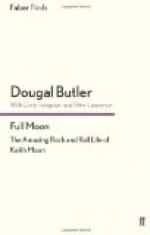The fifth member of the party was Dr. Ravenshaw, who practised in the churchtown where Mrs. Turold had been buried, and had attended her in her illness.
But he had not been asked to share in the family council on that account. His presence was due to his intimacy with Robert Turold, which had commenced soon after the latter’s arrival in Cornwall. The claimant for a title had found in the churchtown doctor an antiquarian after his own heart, whose wide knowledge of Cornish antiquities had assisted in the discovery of the last piece of evidence necessary to establish his claim.
Dr. Ravenshaw sat a little apart from the other, a thickset grey figure of a man, with eyes reddened as though by excessive reading, and usually protected by glasses, which just then he had removed in order to polish them with his handkerchief. In age he was sixty or more. His thick grey beard was mingled with white, and the heavy moustache which drooped over his mouth was quite white. He presented a common-place figure in his rough worn tweeds and heavy boots, but he was a man of intelligence in spite of his unassuming exterior. He lived alone, cared for by a single servant, and he covered on foot a scattered practice among the fishing population of that part of the coast. His knowledge of Cornish antiquities and heraldic lore had won him the confidence of Robert Turold, and his kindness to Mrs. Turold in her illness had gained him the gratitude of her daughter Sisily.
It was Austin Turold who caused a diversion in this group of lay figures by walking to the table and helping himself to a whisky-and-soda. Austin bore very little resemblance to his grim and dominant elder brother. He had a slight frail figure, very carefully dressed, and one of those thin-lipped faces which seem, to wear a perpetual sneer of superiority over commoner humanity. The movements of his white hands, the inflection of his voice, the double eyeglass which dangled from his vest by a ribbon of black silk, revealed the type of human being which considers itself something rarer and finer than its fellows. The thin face, narrow white forehead, and high-bridged nose might have belonged to an Oxford don or fashionable preacher, but, apart from these features, Austin Turold had nothing in common with such earnest souls. By temperament he was a dilettante and cynic, who affected not to take life seriously. His axiom of faith was that a good liver was the one thing in life worth having, and a far more potent factor in human affairs than conscience. He had at one time regarded his brother Robert as a fool and visionary, but had seen fit to change that opinion latterly.




